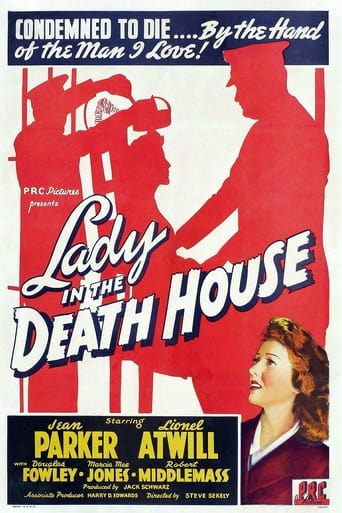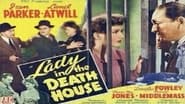kapelusznik18
****SPOILERS**** With his girlfriend Mary Kirk Logan, Jean Parker,to be executed that evening at 11:00 PM sharp the Sing Sing Prison executioner Dr. Brad Bradford, Douglas Fowley, is finding it more and more difficult to do his job in juicing her, by pulling the switch, in the prison's hot seat. It's then that the movie goes into back or forward mode, were not quite sure which one, with famed psychologist Charles Finch, Lionel Atwill, telling a group of friends about a letter he received from Mary just before she was to be executed. In it Mary explains how she's been framed in killing the person who was blackmailing her, in revealing her dad's criminal past to her boss, mobster Willy Mullin, Dick Curtis, by someone who did him in while she was locked up in another room in her apartment.The flashback scene comes across as if it were in the present making it more and more difficult to gage what time is taking place in the movie. We slowly get the message that it was Mary's kid sister the bug eyed and spaced out Suzy, Marcia Mea Jones, who knew who killed Millen and is covering it up at the expense of her older sister Mary's life. It's Finch who slowly uncovers the person, through a number of clues, who killed Millen but as usual in movies like this, working against the clock, time is running out for Mary to be saved from being zapped. With the only person who can save her Governor Harrison, Sam Flint, nowhere to be found and contacted before 11:00 PM the time for Bradford to pull the switch.****SPOILERS**** Lionel Atwill in one of his last appearances, he passed away two years later, is excellent as both psychologist and part time private eye Charles Finch who saves the day as well as Mary Kirk's life by getting the Governor, through a radio broadcast, to get the news that Mary is innocent and stop her execution. But it was Mary's boyfriend Brad Bradford that made that all possible by at the very last moment refusing to pull the switch and locking himself up in the power room that gave Finch the needed time to get the word out to Gov. Harrison about her being innocent. Thus stopping in the nick of time Mary's impending execution.
JohnHowardReid
By the extremely humble standard of PRC, this is not a bad movie at all. In fact, if we can accept the somewhat unbelievable manipulations of the plot (e.g. the doomed heroine's boyfriend just happens to the state's official executioner) and the implied but strong criticism of the U.S.A. justice system, it's quite a revelation. Here are just a few of many examples of the script's unstated but strongly implied resumé of slip-shod "justice": Short- sighted Byron Foulger's testimony is, to say the least, highly questionable, but the heroine's totally inept attorney doesn't call him to account at all, and the half asleep judge is so totally incompetent that he too notices nothing unusual in either the testimony itself or the way it is interpreted. Nor presumably does the judge intervene when the jury delivers an obviously half-baked verdict. Worst of all, we are then presented with a careless and totally irresponsible governor – presumably a Republican – who doesn't bother to stay at his desk on the night of the execution, let alone ring the prison or have his secretary stand by at the phone. Instead, he's gadding about at a roadside diner! Fortunately, Lionel Atwill manages to hold the plot together and, despite all, the film does emerge as a second feature winner. Jean Parker makes an attractively convincing heroine, while Douglas Fowley holds down an unusual role as the sympathetic executioner. Available on an excellent Grapevine DVD coupled with the far superior 20th Century Fox "B", Behind Green Lights.
bensonmum2
As the movie opens, Mary (Jean Parker) is making her way to the electric chair. Crimanologist/psychologist Charles Finch (Lionel Atwill) believes Mary to be innocent, but is running out of time to prove it. To make matter worse, Mary's boyfriend is the State's executioner and will throw the switch on Mary. Can Mary be saved in time? Lady in the Death House is far from the worst of the Poverty Row films I've seen, but it still has a number or problems. First, there are far too many utterly ridiculous plot points. To start with, Mary's boyfriend is (conveniently) the executioner. Why not get someone else to do this one? Ridiculous! The witnesses used at the trial that help convict Mary saw the murder through a solid shade, meaning they only saw a silhouette. Any first year law student could have poked holes in this eyewitness evidence. Ridiculous! Next, as evidence is gathered that will clear Mary, the Governor, the only person who can stop her execution, has (inconveniently) stopped for a Denver sandwich and can't be reached. Again, ridiculous! There are many more of these ridiculous moments that make much of the movie . . . ridiculous.That's not to say it's all bad. Lady in the Death House does feature better than expected (at least for this kind of movie) acting. Lionel Atwill is the kind of actor that's always good. It's an interesting change of pace seeing him play the hero. Jean Parker, Douglas Fowley, and Marcia Mae Jones hold up their end and give solid performances. Another plus is the "look" of the film. A lot of these Poverty Row films look like they were shot on the same dirty, poorly lit set. Not here. Sets and lighting look better than the budget would suggest. Finally, I thought the use of flashbacks was a nice way to tell the story of Lady in the Death House. We see Mary headed to the electric chair, but have to wait 50+ minutes to see if she really is put to death. Quite nice.Overall, the bad outweighs the good and I'm left rating the movie a 4/10.
zardoz-13
This low-budget but entertaining crime thriller about a dame scheduled to die in the electric chair for a murder that she didn't commit is a fine example of a movie that impugns the death penalty. Mary Kirk Logan (Jean Parker)has been shielding her younger sister Suzy and herself from the truth that her father was a criminal in the pin-ball racket. Nevertheless, one of her father's old accomplices, Willis Millen (Dick Curtis) has come back to blackmail her because he knows that she has some of her dad's dough. Moreover, Millen knows that her stiff, stuck-up, morally superior boss, Gregory (George Irving),will fire her if he catches a whiff of her shady past. Actually, Mary's boss at the bank, who hired her because he needed somebody who he could trust to handle confidential information, played a crucial role in a law and order crusade to put her father behind bars. As it turns out, Mary has been paying a high price to buy the silence of her the silence of her father's former associate. Ironically, the villain who is blackmailing Mary is considered a low-life even by his own kind. Mary has managed to fool Gregory about her checkered past for five years."Lady in the Death House" opens with Mary taking the final 39 steps of her life to the electric chair. She has been convicted of a murder that she didn't commit based on the testimony of two passersby who were staring up at the window in her apartment when the murder occurred. All these two spectators really saw was two dark shadows against a fully lighted window with the shade pulled down. Nevertheless, they swear under oath that they saw Mary kill Millen. It doesn't help matters that they rushed up to Mary's apartment after the murder and found the slain man in the floor with the murder weapon--a statue--nearby his body. Millen uttered Mary's name as his final words and the police detective (Cy Kendall)puts two and two together to convict Mary. Since Millen was trying to blackmail Mary, the detective argues that Mary killed Millen to thwart his scheme. Happily for Mary, she knows a tenacious criminologist Charles Finch (Lionel Atwill) who uses his skills to set her free."Revenge of the Zombies" director Steve Sekely tells the story in flashback for maximum suspense and doesn't have Mary exonerated until the last three minutes.




